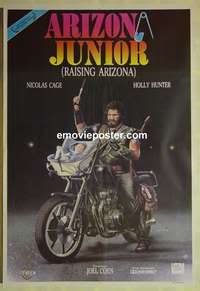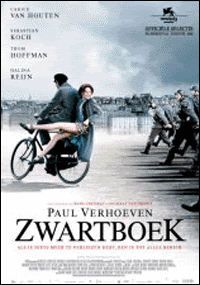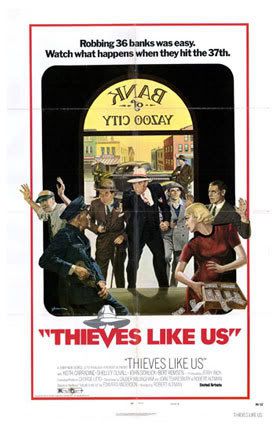 i'd been curious about Tashlin since reading his name mentioned in the same breath as Tati's, and Rock Hunter didn't disappoint, though i couldn't have known what to expect. with precious few exceptions, nimble comedy and "serious film" seem to have gone their separate ways decades ago, so it's always a joy to discover an auteur like Tashlin with such carefree aptitude for it; it's true that he betrays a background in animation through his pacing, control of the frame, and mildly surreal zaniness, but what's most impressive is how he manages to fold it all into an affable (but wholly sharp-witted) consumerist/celebritist satire with such little trouble. i'm eager to see more of Tashlin's work, Jerry Lewis be damned.
i'd been curious about Tashlin since reading his name mentioned in the same breath as Tati's, and Rock Hunter didn't disappoint, though i couldn't have known what to expect. with precious few exceptions, nimble comedy and "serious film" seem to have gone their separate ways decades ago, so it's always a joy to discover an auteur like Tashlin with such carefree aptitude for it; it's true that he betrays a background in animation through his pacing, control of the frame, and mildly surreal zaniness, but what's most impressive is how he manages to fold it all into an affable (but wholly sharp-witted) consumerist/celebritist satire with such little trouble. i'm eager to see more of Tashlin's work, Jerry Lewis be damned.
Thursday, May 31, 2007
frank tashlin's WILL SUCCESS SPOIL ROCK HUNTER? (1957)
 i'd been curious about Tashlin since reading his name mentioned in the same breath as Tati's, and Rock Hunter didn't disappoint, though i couldn't have known what to expect. with precious few exceptions, nimble comedy and "serious film" seem to have gone their separate ways decades ago, so it's always a joy to discover an auteur like Tashlin with such carefree aptitude for it; it's true that he betrays a background in animation through his pacing, control of the frame, and mildly surreal zaniness, but what's most impressive is how he manages to fold it all into an affable (but wholly sharp-witted) consumerist/celebritist satire with such little trouble. i'm eager to see more of Tashlin's work, Jerry Lewis be damned.
i'd been curious about Tashlin since reading his name mentioned in the same breath as Tati's, and Rock Hunter didn't disappoint, though i couldn't have known what to expect. with precious few exceptions, nimble comedy and "serious film" seem to have gone their separate ways decades ago, so it's always a joy to discover an auteur like Tashlin with such carefree aptitude for it; it's true that he betrays a background in animation through his pacing, control of the frame, and mildly surreal zaniness, but what's most impressive is how he manages to fold it all into an affable (but wholly sharp-witted) consumerist/celebritist satire with such little trouble. i'm eager to see more of Tashlin's work, Jerry Lewis be damned.
Monday, May 28, 2007
gore verbinski's PIRATES OF THE CARIBBEAN: DEAD MAN'S CHEST (2006) and AT WORLD'S END (2007)
 the first Pirates Of The Caribbean film was, against all logic concerning how good an adaptation of a theme park ride ought to be, a hell of a good time at the movies. cautionary tales like Cutthroat Island aside, it's almost suspicious that it took until 2003 for Hollywood to trot out a big, dumb pirate movie revival, but they got it right, exploring and seemingly exhausting nearly every idea we could have wanted to see in a $140 million supernatural swashbuckler. the last ten months, though, suggest that screenwriters Ted Elliott and Terry Rossio had enough material for three or four more films...and chose to cram them all into two.
the first Pirates Of The Caribbean film was, against all logic concerning how good an adaptation of a theme park ride ought to be, a hell of a good time at the movies. cautionary tales like Cutthroat Island aside, it's almost suspicious that it took until 2003 for Hollywood to trot out a big, dumb pirate movie revival, but they got it right, exploring and seemingly exhausting nearly every idea we could have wanted to see in a $140 million supernatural swashbuckler. the last ten months, though, suggest that screenwriters Ted Elliott and Terry Rossio had enough material for three or four more films...and chose to cram them all into two.neither of the sequels is bad, of course. both are just as entertaining as the first, and do their duty as sequels to up the ante with new characters and increasingly strange voyages. but the narrative thread Elliott and Rossio have split between the two films is so crushingly maximalist that it often verges on collapse, and occasionally pulls the films down with it. on one hand, they've built an impressive self-contained mythology, rewarding those viewers who pay closer attention to the films than may seem necessary; on the other, the films sometimes have trouble staying afloat carrying such convoluted cargo. no less mutinous is the six-act structure of the story, which in retrospect leaves far too much hanging in the balance between the two films for either to feel complete in and of itself -- the "see you and your money next summer for the rest of the movie" angle does more than anything else to insist on the films as simple commerce instead of carefree entertainment.
yet i can't help being impressed by Gore Verbinski, who has shown himself to be an extremely talented, loving shepherd for mainstream cinema, from his astouding translation of The Ring to Pirates' giddy spectacle. he doesn't quite have the storytelling chops to rival Peter Jackson's grab for Spielberg heirdom, but keeping everything so engaging amidst the narrative chaos (even during World's End's laborious, 45-minute long climax) is a feat no simple technician could have gotten away with. added to Rick Heinrichs' pitch-perfect production design, uniformly stunning effects work, Keira Knightley's insuppressible good looks, and the combined scenery-chewing of Bill Nighy, Geoffrey Rush and Johnny Depp, it would be somewhat of a feat to dislike the films outright; here it will have to be enough that the good far outweighs the bad.
Wednesday, May 16, 2007
the coen brothers' RAISING ARIZONA (1987)
 as the Coens' mainstream debut, Raising Arizona is a work of extreme gall, an assured live-action cartoon that sees their comic sensibilities emerge full-grown. the most impressive thing to me has always been the opening sequence, as Nic Cage (never better than he was here) narrates a relentless expository montage of visual wit and assured scene-setting that maintains its energy to the bitter end, as the opening titles finally cease the fast-forward. but the film as a whole is vintage Coen: brilliantly dedicated performances, warm eccentricity, and a script as poetically airtight as it is madcap.
as the Coens' mainstream debut, Raising Arizona is a work of extreme gall, an assured live-action cartoon that sees their comic sensibilities emerge full-grown. the most impressive thing to me has always been the opening sequence, as Nic Cage (never better than he was here) narrates a relentless expository montage of visual wit and assured scene-setting that maintains its energy to the bitter end, as the opening titles finally cease the fast-forward. but the film as a whole is vintage Coen: brilliantly dedicated performances, warm eccentricity, and a script as poetically airtight as it is madcap.
Tuesday, May 15, 2007
alexandre aja's THE HILLS HAVE EYES (2006)
 this is one of the very few films i've ever walked out of at the theater. it was on kim's initiative, but i can't say i wasn't myself inclined - and it's for that reason i've retained a curiosity about The Hills Have Eyes. i've got a reasonably high threshold for Horror's darker territories, but the film exists in such a perfect storm of nihilism and moral filth that it very honestly, deeply offended and affected me, and because of that i've no place denying it as a work of art. poor existential taste does nothing to dull Aja on a technical level; he stretches the first act out almost unbearably, but does so with such confidence that doom's dull roar has grown deafening by the time the film's brutal, balls-to-the-wall centerpiece siege yanks the narrative into oppressively high gear. part of me was bothered by the genuinely crass sexual violence, uncomfortably misogynistic in its deployment as little more than a cheap scare amplifier. but another part of me was terribly compelled by the film's sullied slickness and fearless sociopathy, and how they dare to combine in the form of entertainment.
this is one of the very few films i've ever walked out of at the theater. it was on kim's initiative, but i can't say i wasn't myself inclined - and it's for that reason i've retained a curiosity about The Hills Have Eyes. i've got a reasonably high threshold for Horror's darker territories, but the film exists in such a perfect storm of nihilism and moral filth that it very honestly, deeply offended and affected me, and because of that i've no place denying it as a work of art. poor existential taste does nothing to dull Aja on a technical level; he stretches the first act out almost unbearably, but does so with such confidence that doom's dull roar has grown deafening by the time the film's brutal, balls-to-the-wall centerpiece siege yanks the narrative into oppressively high gear. part of me was bothered by the genuinely crass sexual violence, uncomfortably misogynistic in its deployment as little more than a cheap scare amplifier. but another part of me was terribly compelled by the film's sullied slickness and fearless sociopathy, and how they dare to combine in the form of entertainment.watching the rest of the film from where i left off more than a year ago, it's an inevitable disappointment that soon afterwards The Hills Have Eyes declines into a Troma Team remake of Straw Dogs, and never again reaches the fever pitch of the scene that sent us (and another couple a few rows behind us) back to the lobby. it's still engaging, and fx stalwarts KNB work their usual magic on the desert colony of sun-baked mutants, each uniquely horrific. but after the tension and release of the first half, the rest of the film can't help but color pretty much within the lines, which makes it a little harder to hate, and much harder to respect. still, it's been a long time since a horror movie bothered me as badly as Aja did here, and on its own terms that makes it a roaring success.
Friday, May 11, 2007
paul verhoeven's BLACK BOOK (2006)
 Paul Verhoeven’s career arc has been a strange one: after establishing himself in the Netherlands with thrillers like Soldier of Orange and The Fourth Man, he arrived in hollywood to direct a curious, sensationalistic string of popcorn movies belying an obsession with the extremes of both violence and sexuality. some were good (Robocop and Starship Troopers are as fun as sci-fi satire gets) and some weren’t (remember Hollow Man? on second thought, don’t) but all of them reflect surprisingly deeply on a slick artist undaunted by america’s cineplex conservatism. And though it was perhaps inevitable that Verhoeven would return to Europe and his filmmaking roots, few could have expected the resulting Zwartboek (Black Book), which stands as one of his finest achievements even as it out-hollywoods his american work in many key ways.
Paul Verhoeven’s career arc has been a strange one: after establishing himself in the Netherlands with thrillers like Soldier of Orange and The Fourth Man, he arrived in hollywood to direct a curious, sensationalistic string of popcorn movies belying an obsession with the extremes of both violence and sexuality. some were good (Robocop and Starship Troopers are as fun as sci-fi satire gets) and some weren’t (remember Hollow Man? on second thought, don’t) but all of them reflect surprisingly deeply on a slick artist undaunted by america’s cineplex conservatism. And though it was perhaps inevitable that Verhoeven would return to Europe and his filmmaking roots, few could have expected the resulting Zwartboek (Black Book), which stands as one of his finest achievements even as it out-hollywoods his american work in many key ways.Black Book tells the story of german jew Rachel Steinn (Carice van Houten) as she hides out among the dutch resistance toward the end of world war II, gradually taking on an active espionage role after she befriends german officer Ludwig Müntze (The Lives Of Others’ Sebastian Koch) and is offered a job inside SD headquarters. to elaborate much further would be both confusing and a disservice to the film, as Verhoeven and co-screenwriter Gerard Soeteman pack the film with a serpentine, almost Hitchcockian series of twists and turns that constantly confront Rachel (spending most of the film under the pseudonym Ellis de Vries) as she pursues not only safety but justice.
being a Paul Verhoeven picture, of course, the film is steeped in both graphic, affecting violence and unabashed sexuality, but where his american work seemed to revel in its excesses and indulgences, Black Book folds these preoccupations organically into the story, and lets Verhoeven concentrate on its telling. and it’s here that the hollywood influence shows – not in any of the ways his american films might suggest, but a more classical sense, from the austere period sensibility and low-key glossiness to Anne Dudley’s pitch-perfect score and van Houten’s rapturously confident, star-making performance. the most potent contribution to the film’s americanized aesthetic, though, is a decided emphasis on entertainment over the themes and grand ideas we’ve come to expect from european resistance dramas: Black Book is a thriller, plain and simple, and a rousing one at that.
still, there’s a creative maturity in the way such an entertainment is approached. sentimentality is one hollywood tradition that Verhoeven never had much use for, and Black Book is little different in that respect, putting forth a comparatively chilly narrative tone that doesn’t manipulate its audience by lingering unnecessarily on the emotions in play. one of the more obvious dividends of this approach is an enhanced brutality, most noticeable in the harrowing firefights but also observable on an emotional level throughout the film, particularly in Rachel’s subtly escalating psychological humiliation at the hands of the SD officer unknowingly responsible for her family’s deaths. more crucially, this lack of sentimentality also allows for an enriching idealistic relativism; both the subtext and the story itself are informed by the notion that all people, even in times of such great wickedness, tread the gray waters between good and evil.
(from the KNOXVILLE VOICE)
robert altman's THIEVES LIKE US (1974)
 this came out on DVD two weeks ago, but apparently not in Knoxville, so i had to catch it in lousy, compressed full-frame on cable. still, it floored me: as with most of his early work, Altman approaches a well-trod premise (here a tale of Depression-era bank robbers) from an angle that momentarily perfects it. he compensates for a necessarily restrained visual approach by playing with diagetic sound much in the way he did in MASH, but to a different end; where MASH's loudspeaker announcements helped reinforce an ironic distance, Thieves Like Us' omniscient radio crackle pulls us in emotionally while serving its more basic (and equally effective) role as aural set dressing, perfectly evoking a time and place. the film takes on an easygoing, naturalist pace, budgeting more time for scenes of silence and quiet psychology than it does for its antiheroes' antics, and accordingly telling an old story as well as anyone ever has. but it still takes itself seriously as a crime film, albeit a different sort of one, as Altman's primary preoccupation seems to be the state of mind that forces three men to define themselves according to their sociopathic behavior. the film's title weaves itself informally and offhandedly through each character's speech over the course the film, and even as the most sympathetic of the trio (a superb Keith Carradine) goes through the motions of grasping at legitimacy through the strength of young love, we realize along with him that he's not built to be anything but lowdown. it's sad, yes, but it's also as close as Altman has come to naked reality.
this came out on DVD two weeks ago, but apparently not in Knoxville, so i had to catch it in lousy, compressed full-frame on cable. still, it floored me: as with most of his early work, Altman approaches a well-trod premise (here a tale of Depression-era bank robbers) from an angle that momentarily perfects it. he compensates for a necessarily restrained visual approach by playing with diagetic sound much in the way he did in MASH, but to a different end; where MASH's loudspeaker announcements helped reinforce an ironic distance, Thieves Like Us' omniscient radio crackle pulls us in emotionally while serving its more basic (and equally effective) role as aural set dressing, perfectly evoking a time and place. the film takes on an easygoing, naturalist pace, budgeting more time for scenes of silence and quiet psychology than it does for its antiheroes' antics, and accordingly telling an old story as well as anyone ever has. but it still takes itself seriously as a crime film, albeit a different sort of one, as Altman's primary preoccupation seems to be the state of mind that forces three men to define themselves according to their sociopathic behavior. the film's title weaves itself informally and offhandedly through each character's speech over the course the film, and even as the most sympathetic of the trio (a superb Keith Carradine) goes through the motions of grasping at legitimacy through the strength of young love, we realize along with him that he's not built to be anything but lowdown. it's sad, yes, but it's also as close as Altman has come to naked reality.
Saturday, May 05, 2007
sam raimi's SPIDER-MAN 3 (2007)
 what happened here? the third Spider-Man seems to have been systematically purged of everything that made the second one such an unmitigated creative success. attention to character, thematic unity, careful pacing, performance, and, most crucially, expert storytelling...every one jettisoned in favor of bloat and lazy spectacle. it's not a bad film, really, but it wrestles fruitlessly with a mediocrity that, at this point in the series, should never have been part of the equation. (i'm tempted to elaboate on its weaknesses, but it would be little more than a long list of the small mistakes and miscalculations that undermine the film from start to finish.) Spider-Man 3 is a $250 million dollar first draft of what it could have and should have been, and nothing less than a colossal disappointment.
what happened here? the third Spider-Man seems to have been systematically purged of everything that made the second one such an unmitigated creative success. attention to character, thematic unity, careful pacing, performance, and, most crucially, expert storytelling...every one jettisoned in favor of bloat and lazy spectacle. it's not a bad film, really, but it wrestles fruitlessly with a mediocrity that, at this point in the series, should never have been part of the equation. (i'm tempted to elaboate on its weaknesses, but it would be little more than a long list of the small mistakes and miscalculations that undermine the film from start to finish.) Spider-Man 3 is a $250 million dollar first draft of what it could have and should have been, and nothing less than a colossal disappointment.
Wednesday, May 02, 2007
doug liman's MR & MRS SMITH (2005)
Subscribe to:
Posts (Atom)
.jpg)



